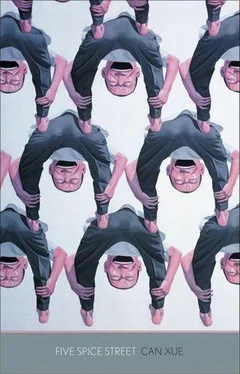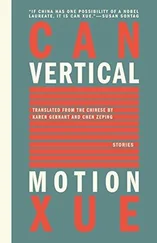Can Xue - Five Spice Street
Здесь есть возможность читать онлайн «Can Xue - Five Spice Street» весь текст электронной книги совершенно бесплатно (целиком полную версию без сокращений). В некоторых случаях можно слушать аудио, скачать через торрент в формате fb2 и присутствует краткое содержание. Год выпуска: 2009, Издательство: Yale University Press, Жанр: Современная проза, на английском языке. Описание произведения, (предисловие) а так же отзывы посетителей доступны на портале библиотеки ЛибКат.
- Название:Five Spice Street
- Автор:
- Издательство:Yale University Press
- Жанр:
- Год:2009
- ISBN:нет данных
- Рейтинг книги:5 / 5. Голосов: 1
-
Избранное:Добавить в избранное
- Отзывы:
-
Ваша оценка:
- 100
- 1
- 2
- 3
- 4
- 5
Five Spice Street: краткое содержание, описание и аннотация
Предлагаем к чтению аннотацию, описание, краткое содержание или предисловие (зависит от того, что написал сам автор книги «Five Spice Street»). Если вы не нашли необходимую информацию о книге — напишите в комментариях, мы постараемся отыскать её.
they
Five Spice Street
Five Spice Street — читать онлайн бесплатно полную книгу (весь текст) целиком
Ниже представлен текст книги, разбитый по страницам. Система сохранения места последней прочитанной страницы, позволяет с удобством читать онлайн бесплатно книгу «Five Spice Street», без необходимости каждый раз заново искать на чём Вы остановились. Поставьте закладку, и сможете в любой момент перейти на страницу, на которой закончили чтение.
Интервал:
Закладка:
And thus we verified people’s thinking of them as two deformed, sick seeds that had been steeped in poison. Thus, the historical roots of what happened on our street are plain as day.’
‘‘All of a sudden, the writer grasped the truth: he was suddenly enlightened. After writing this section, his head was clear and his body relaxed. He was so pleased that he started humming a song, ‘The Golden Sun Rises in the East.’ That night, when the writer’s document was read and discussed in the large hall, the writer was full of confidence as he sat beneath the stage and listened to someone read it aloud. He began sobbing when he heard the best part, he was so amazed by his own talent. After the person finished reading aloud, the sound of furtive whispers immediately arose, and then became hushed-frighteningly quiet. Something was wrong: it was as though everyone was holding his breath. And then, at some point, these people scooted away from the meeting one by one. The writer finished crying, massaged his bloodshot eyes, and went up to the stage. In a hoarse voice he told the crowd how his opus was born. As he talked, he looked down and saw row after row of empty chairs, and so he sat down dejectedly on the floor. The crowd’s emotions were hard to get hold of. This was a head-on blow! What was an artist if he lost his dear readers all at once? Wasn’t he utterly worthless? Hadn’t he sunk to being a tramp? A flower bloomed beautifully, although without its stem and root, it was weird, ghostly. The artist could become sublime and his inspiration could flow uninterruptedly only when he was taken into the readers’ warm and generous embrace. But if the readers abandoned him, he became an orphan and his talent dried up. Art was also isolated from him. This is common sense; everyone knows it. Where on earth had the writer failed and made such an irreparable error? Why had a wall been erected between him and his readers? Could it be that, just as his writing had a period of growth, now it had been cut off at the waist by some demon, and everything was finished? Could his brilliant artistic career be ended like this for some unknown reason? What the hell kind of subtle relationship did the damn X and Q have with the crowds on Five Spice Street? The writer’s freewheeling imagination, his inflated adjectives, and his artistic conceptions had evidently provoked the sensitive people, and so the document itself had to be abandoned. Why couldn’t the writer understand this relationship by empathizing with others? Had his ideology begun to petrify? With great pain, the writer engaged repeatedly in self-criticism. With misty, tear-filled eyes, he also examined the part the readers had found offensive three times, and finally made up his mind that he would take the blame and go door to door, apologizing in person. The writer felt that taking this step wouldn’t indicate inferiority, but rather would show his splendid individuality. Someday the crowds would understand genius and come to stand next to genius. Maybe they were looking out their windows and expecting his arrival. And maybe they were already feeling sorry for him and were opening their generous hearts, waiting for him to throw himself on their mercy! Maybe they already realized that they had simply overreacted.
‘‘The first reader the writer called on was the widow who wore the little felt hat. The writer had weighed this matter several times and decided that he would make a good start at her place, because women, and especially old women, were all good, softhearted people who couldn’t stand to see a young person’s promising future ruined. When someone seeking help called on them, they would offer it warmly and give advice: some would even come out in the open on your behalf. Starting from their maternal instincts and also their women’s intuition (upon coming into contact with young men, they always suddenly recaptured their passionate youth and would give the supplicant everything he hoped for), they were generous to a fault and didn’t ask to be repaid. Embracing this hope, the writer walked that slippery slope and entered the old widow’s home. It was midnight: there was no Hg hton in the house, and the door was unlocked. To the right of the entry was a bed. The writer knew the widow wasn’t asleep, because he heard groans and the sounds of tossing and turning. He felt his way to the bed, intending to sit on the side of it. Unexpectedly, the widow kicked him hard, and he almost fell. ‘You can sit on the floor.’ The widow said resolutely, ‘It’s as though a fire is burning in my heart. I am a very direct person.’ The writer sat down gingerly on something that was like a pile of coal ashes. He didn’t make a sound, intending to listen respectfully to what she had to teach him. The old woman was silent a long time and then finally let out an agonized sigh and began talking: ‘Tonight, when I heard your document being read, my heart seemed to ignite. So many words written in a dirty notebook, and even a few inky fingerprints on the cover. You are too profligate, overindulging in trivia. I heard that while you’re writing, you sit on the floor like this and never wash your hands. I can imagine that you also touch your saliva with your black fingers as you turn the pages. At first, I didn’t care about whatever it was you wrote, because at the time I was dozing off. But when the one reading your document suddenly roared, I fell off my chair at once. After I got home, I couldn’t get to sleep, because I kept wondering whether you were attacking through innuendo. Otherwise, how could that person shout so loud as to scare a person? I’m in a bad mood tonight. Maybe, because I’m downhearted, I won’t want to help you. That shout was just too frightening. How can you reproduce that shout in your document? I planned to take part in the work of annotating your text along with everyone else. I think you are talented, but what was that shout all about? No, no. This contradicts my tastes and sentiments. Maybe you intended to show your superiority. You certainly make me seem very depraved. I’d rather stay away from doing the annotations. I’m so confused inside.’ She made a few gu-gu sounds and then buried her head in the straw bedding.
‘‘The writer humbly begged her to take his hand to show that she still wanted to be one of his readers, because otherwise ‘he would go crazy.’ No other gesture could have suited her fine character and grace more in revealing the beauty of her soul. The writer’s hand was at the edge of the bed: did she feel it? She need only shift a little to touch it.
‘‘ ‘It costs me nothing to do it, but I won’t do it for nothing.’ In the dark, she laughed vaguely and spat repeatedly. ‘I’m the key person, aren’t I? If I am persuaded, you can get everything you want. Both of us know this. I’m not a beauty, but I have enormous energy. My cousin knows this best. It’s no exaggeration to say that he admires me greatly. Just think, after forty years, he’s now an old man, and yet that incident remains fresh in his mind. Can ordinary people remember the past so well? I meditate on this subject from time to time, and I’m astonished at my ability. I see clearly that I can get anything I want. I was born with this omnipotence. Still, I always take the high road: I don’t want to contend for fame and fortune. After I left the meeting tonight, I knew you’d come to see me. It wouldn’t do any good for you to see others, but seeing me, you can get everything you want. What kind of person am I? Can anyone compare with me? Do you understand what I mean now? You’re a stenographer who can at any time write about big events and about people who are characterized by individuality and charm. To you, the most important thing is to have the eyes to penetrate everything. You have to look upon the people around you with far-sighted eyes and analyze which people are worth recording and which are merely a flash in the pan who won’t amount to anything. You shouldn’t choose only the young and beautiful. More often than not, age is directly proportionate to charm. You’ll learn this from experience. In this place, there are some persons of the hour who don’t possess profound genius. They might attract a lot of attention because they’re superficially active, but their hearts are absolute voids. These counterfeits can sometimes pull the wool over the eyes of young people like you, and-on an impulse-you might want to write them into history as heroes. If you do that, they would really start pushing society blindly, and so the entire course of history would slip-all because of your devil-may-care mistake. We can see from this the heavy responsibilities you stenographers must assume- how essential it is for a judicious person with abundant experience to guide you so that you’ll make fewer mistakes. Is it possible that these nameless heroes who work in silence, these people who are humble and cautious on the surface and don’t say much, don’t go out much, and yet actually have astonishing abilities-is it possible that they aren’t more worthy of being written into history than these phonies? Since you’re engaged in this work, why haven’t you noticed these worthy people all around you? Why haven’t you shown great interest in them and pursued them? This is you young stenographers’ biggest disadvantage. If a person doesn’t notice his limitations when he’s young and doesn’t have a cultural forebear (sometimes this cultural forebear and the worthy person are identical) to provide prudent guidance, his latent genius will unconsciously slip away, and in the end, he will have wasted his life and accomplished nothing. Nothing in his entire life will be worth remembering. You don’t run into worthy people all the time. Sometimes, in several centuries there’s only one. The issue is whether you have keen enough eyesight to identify them at first glance. You also need luck. When they have just come to your side and modestly offered to guide you, you might not listen if you lack talent. You will probably think that’s just boasting. But if you’re a genius, you’ll respond strongly, just like falling in love at first sight.’
Читать дальшеИнтервал:
Закладка:
Похожие книги на «Five Spice Street»
Представляем Вашему вниманию похожие книги на «Five Spice Street» списком для выбора. Мы отобрали схожую по названию и смыслу литературу в надежде предоставить читателям больше вариантов отыскать новые, интересные, ещё непрочитанные произведения.
Обсуждение, отзывы о книге «Five Spice Street» и просто собственные мнения читателей. Оставьте ваши комментарии, напишите, что Вы думаете о произведении, его смысле или главных героях. Укажите что конкретно понравилось, а что нет, и почему Вы так считаете.












